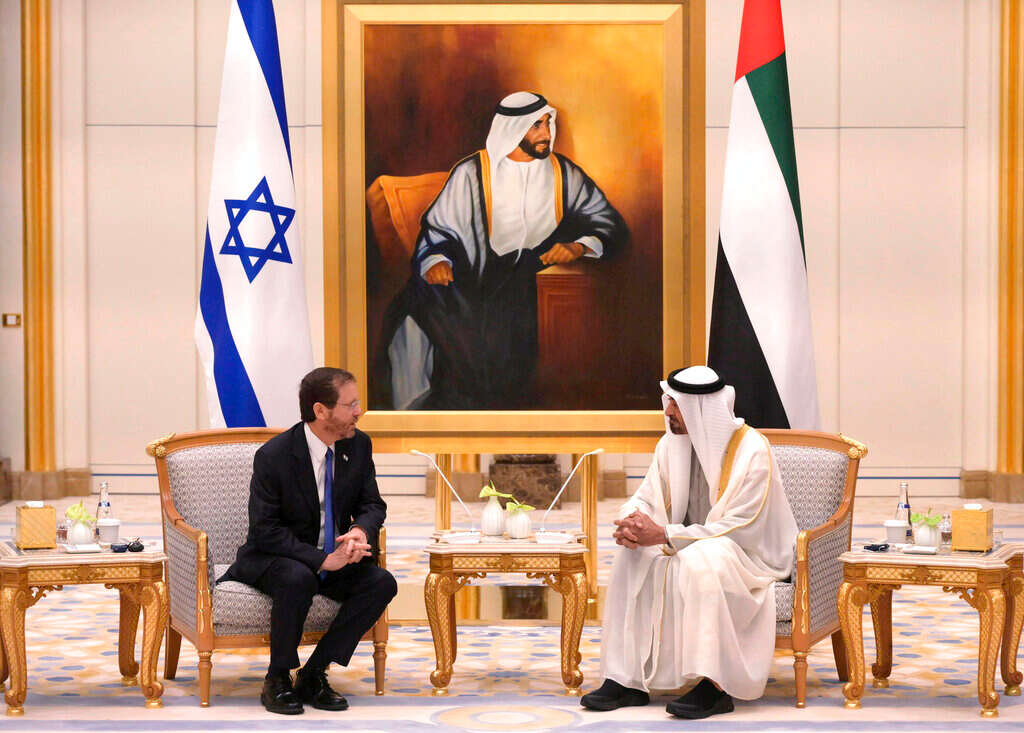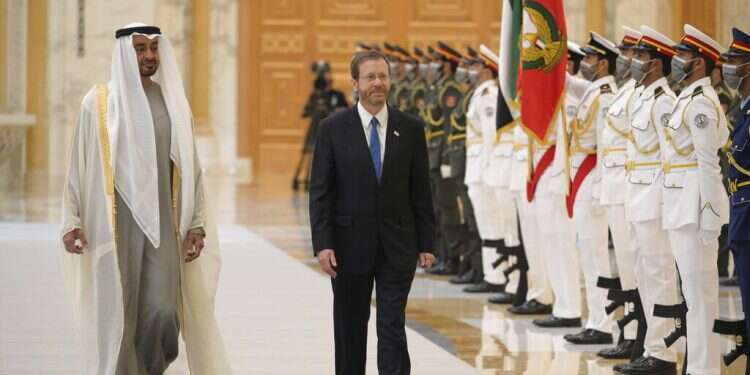The United Arab Emirates intercepted a ballistic missile fired by Yemen's Houthi rebels early Monday as President Isaac Herzog visited the country, local authorities said, the third such attack in recent weeks.
Follow Israel Hayom on Facebook, Twitter, and Instagram
The attack amid Herzog's visit only fuels the ongoing tensions affecting the wider Persian Gulf, which has seen a series of attacks as Iran's nuclear deal with world powers collapsed and Yemen's years-long war raged.
As negotiators in Vienna now attempt to save the accord and Emirati-backed forces press on the Houthis, the rebels are launching their longest-range attacks yet. Those assaults represent a major challenge for the Emirates, which long has advertised itself to international businesses as a safe corner of an otherwise-dangerous neighborhood.
US State Department spokesperson Ned Price condemned the Houthi attack. "While Israel's president is visiting the UAE to build bridges and promote stability across the region, the Houthis continue to launch attacks that threaten civilians," Price wrote on Twitter.
We condemn the latest Houthi missile attack on Abu Dhabi. While Israel's president is visiting the UAE to build bridges and promote stability across the region, the Houthis continue to launch attacks that threaten civilians.
— Ned Price (@StateDeptSpox) January 31, 2022
In the hours after the Houthi attack early Monday, Syrian state-run media said an Israeli strike hit near Damascus. The IDF did not immediately acknowledge it.
The UAE's state-run WAM news agency reported the interception, saying that "the attack did not result in any losses, as the remnants of the ballistic missile fell outside the populated areas."
It wasn't immediately clear where the missile remnants fell. The country's civilian air traffic control agency said there was no immediate effect on air travel in the UAE, home to the long-haul carriers Emirates and Etihad.
Already, the country's top prosecutor has threatened that people who film or post images of such an incident would face criminal charges in the UAE, an autocratic federation of seven sheikhdoms on the Arabian Peninsula. That makes reporting on such incidents even more complicated for journalists.
Video: Roi Avraham
In the absence of those videos, the Emirati Defense Ministry released black-and-white footage it described as showing the destruction of a ballistic missile launcher in Yemen's al-Jawf province some 30 minutes after the attack. Another attack last week saw a similar strike launched on al-Jawf in the minutes after, leading analysts to suggest the Emiratis may be receiving intelligence assistance from the West for its strikes.
Al-Jawf is some 1,350 kilometers (840 miles) southwest of Abu Dhabi.
Houthi military spokesman Yehia Sarei wrote on Twitter that the rebels would make an announcement about an attack in the coming hours that reached into "the depths of the UAE." He did not elaborate. The Houthis' Al-Masirah satellite news channel later reported that airstrikes had begun targeting Sanaa, Yemen's rebel-held capital.
Herzog met Sunday with Abu Dhabi's powerful crown prince, Sheikh Mohammed bin Zayed Al Nahyan.
"I wish to emphasize that we completely support your security requirements and we condemn in all forms and language any attack on your sovereignty," Herzog told the crown prince, according to his office.

The crown prince thanked the president and said that it was "a stance that demonstrates our common view of the threats to regional stability and peace, particularly those posed by militias and terrorist forces, as well as our shared understanding of the importance of taking a firm stance against them."
Herzog's office said early Monday that the trip was "expected to continue as planned" when asked about the missile interception. It did not elaborate. Herzog was scheduled to visit Dubai's Expo 2020 world's fair Monday, which the Houthis had previously threatened to target.
"I am very much looking forward to my visit at the Expo and seeing the most unbelievable experience that everyone is talking about, including the 250,000 Israelis who have already set foot in your beautiful country," he said.
Bin Zayed said that a major thrust of the Abraham Accords was to strengthen economic cooperation and innovation, especially in the areas of technology, innovation, health and energy.
"Our region is one of those that has suffered the most from wars and conflicts," the crown prince said. "Through peace, we in the UAE, Israel and the wider region, can direct resources and capabilities towards serving our nations and paving the way for a better tomorrow.
"There is no doubt that your country's participation in Expo 2020 Dubai is one of the results of this peace, and it will help deepen our cooperation and partnership and identify mutual opportunities for Israel and the UAE," bin Zayed continued.
The president and his wife received a grand official welcoming ceremony at the royal palace. During the ceremony, the Israeli and Emirati national anthems were played, the delegations were presented to the leaders, and then the president reviewed the royal honor guard, which performed a 21-gun salute in honor of his arrival.
"This visit is an expression, as you said correctly, Your Highness, of the vision and dream of peace and the spirit of peace, which we bring to the entire region," Herzog said during the meeting. "We are two successful nations who started with very little in our hands, developed our lands into a successful paradise and in many ways set an example to the world of how to lead and develop a nation with a vision of the future."
He added that "this sends a message to the entire region that there is an alternative of peace and living together, and that the sons and daughters of Abraham can reside and dwell together in peaceful coexistence for the benefit of humanity."
Prime Minister Naftali Bennett in December made his first official visit to the Gulf Arab sheikhdom and discussed strengthening relations on a number of fronts with Sheikh Mohammed. The visits come after the UAE and Bahrain recognized Israel and established diplomatic relations in 2020. Palestinian leaders have condemned the normalization deal as a betrayal of their cause for statehood.
The latest in a series of attacks
Last week, a similar attack saw both Emirati and US forces fire interceptor missiles to bring down Houthi missiles as they struck near Al-Dhafra Air Base in Abu Dhabi, which hosts some 2,000 American troops. The US military did not immediately respond to requests for comment.
The week before that saw a Houthi drone-and-missile attack strike an Abu Dhabi National Oil Co. fuel depot, killing three people and wounding six others. Another attack targeted Abu Dhabi International Airport, though damage wasn't seen in satellite photos analyzed by the Associated Press. That attack came as South Korean President Moon Jae-in visited the Emirates.
The attacks have helped propel benchmark Brent crude oil prices above $90 a barrel, further squeezing a global economy grappling with inflation in the coronavirus pandemic.
Although the UAE has largely withdrawn its own forces from Yemen, it is still actively engaged in the conflict. It supports militias fighting the Iranian-backed Houthis, who seized Yemen's capital, Sanaa, in September 2014. A Saudi-led coalition, which the UAE is a part of, entered the conflict in March 2015.
Iran has denied arming the Houthis, though UN reports, independent analysts and Western nations point to evidence showing Tehran's link to the weapons. Experts, however, debate how much direct control Tehran exercises over the Houthis.
Subscribe to Israel Hayom's daily newsletter and never miss our top stories!
Yemen's war has turned into the world's worst humanitarian crisis, with international criticism of Saudi-led airstrikes that have killed hundreds of civilians and targeted the country's infrastructure. Attacks after the first round of Houthi missile fire on Yemen in January saw the Saudi coalition strike a prison and kill some 90 people, as well as knock the country off the internet for days.
The Houthis meanwhile have used child soldiers and indiscriminately laid landmines across the country.
The missile attacks targeting the UAE come as the Houthis face pressure and are suffering heavy losses on the battlefield. Aided by the Emirati-backed Giants Brigades, Yemeni government forces took back the province of Shabwa earlier this month in a blow to Houthi efforts to complete their control of the entire northern half of Yemen.
While Emirati troops have been killed over the course of the conflict, until this month the war hadn't directly affected daily life in the wider UAE, a country with a vast foreign workforce.




